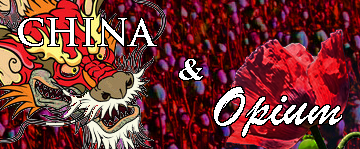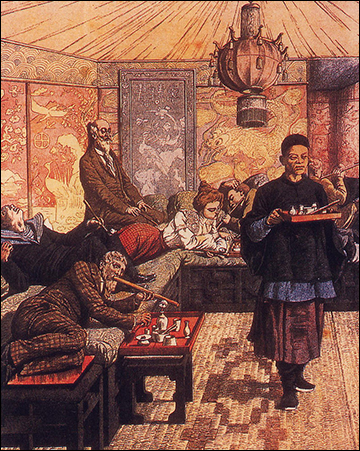



Scene:
Watching a TV adaptation of the Agatha Christie short story ‘The Lost Mine’. A young stockbroker is lured to an opium den in China town in London, drugged and incriminated in a murder.
The opium den is depicted as a dark room with semi-conscious figures reclining on cushions with opium pipes in their hands.
Idea:
The term ‘Opium Den’ has an invariable Chinese association in my mind. But is this notion justified?

In the 18th century the demand for Chinese luxury goods (particularly silk, porcelain, and tea) created a huge trade imbalance between China and Britain. To counter this, although China had outlawed the opium trade in 1729, the British East India Company began to grow opium in Bengal, in present-day Bangladesh, and allowed private British merchants to sell opium to Chinese smugglers for illegal sale in China.*1*
The influx of narcotics reversed the Chinese trade surplus, drained the economy of silver, and increased the numbers of opium addicts inside the country. By the early nineteenth century opium was the principal product that the English East India Company traded in China and opium addiction was becoming a widespread social problem.*2*
In 1839 the Chinese emperor sent a commissioner, Lin Zexu, to Canton to negotiate an end of the trade. He sent a famous letter to Queen Victoria pleading for her assistance.*3* His pleas were ignored, so he siezed the opium stocks in Canton. This led to the first opium war, which Britain won decisevely.
In light of these background facts, the notion of degenerate Chinese people smoking opium changes to Chinese people being victims of an evil British plot to enslave them to a drug — quite a different image to that portrayed in the Agatha Christie story.*4*
__________________
When an idea — any idea, no matter how outlandish — is published in a book (or portrayed on screen), it is given 'existence' and hence accrues a certain credence by being published. The term for this is 'the orthodoxy of the book'.*5*
__________________
This is also an example of how the meaning of a document derives from the context of its creation. Reading words without understanding the whole context of the act of their writing is misleading.
__________________
7th May 2024 note: 'Smoke and Ashes: Opium’s Hidden Histories' by Amitav Ghosh, published Feb. gives an authoritative history of the opium trade.
* * * * *
1. First opium war. Wikipedia ‘First Opium War’. (Back)
2. Opium Wars. Wikipedia ‘Opium War’. (Back)
3. Letter of Advice to Queen Victoria. Document archive site. (Back)
4. Full video. See around 37 minute mark. (Back)
5. Goody, Jack 1977, The Domestication of the Savage Mind, Cambridge University Press. p. 37: ". . . The specific proposition is that writing, and more especially alphabetic literacy, made it possible to scrutinise discourse in a different kind of way by giving oral communication a semi-permanent form; this scrutiny favoured the increase in scope of critical activity, and hence of rationality, scepticism, and logic ... No longer did the problem of memory storage dominate man’s intellectual life; the human mind was freed to study static 'text' . . . By making it possible to scan the communications of mankind over a much wider time span, literacy encouraged, at the very same time, criticism and commentary on the one hand and the orthodoxy of the book on the other." (Back)